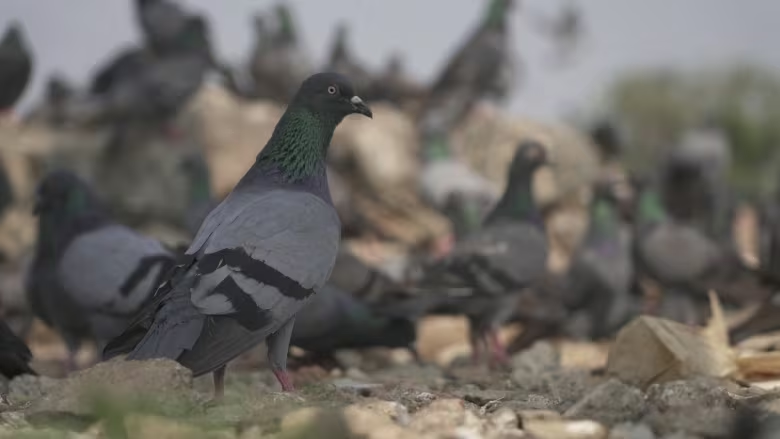
The number of pigeons in Mumbai has significantly increased in recent years, and local doctors attribute this surge to a fivefold rise in cases of hypersensitivity pneumonitis, a severe lung inflammation. (Photo by Glen Kugelstadt/CBC)
In a clinic situated in the northern suburbs of Mumbai, Dr. Pralhad Prabhudesai, a pulmonologist, is witnessing a concerning trend. Over the past seven years, there has been a significant fivefold surge in cases of hypersensitivity pneumonitis, a severe lung inflammation, among the residents of India's most populous city. The cause? A burgeoning pigeon population in Mumbai, whose droppings harbor fungi that, when inhaled over an extended period, can trigger this immune system disorder.
Describing the condition as "terrible" and "progressive," Dr. Prabhudesai emphasizes that chronic cases of hypersensitivity pneumonitis can lead to irreversible lung scarring, necessitating a constant oxygen supply or even a lung transplant. Among the various causes of this ailment, exposure to pigeons emerges as the most common in the country.
Recent studies tracking newly diagnosed patients in India highlight birds, particularly pigeons, as the primary link to the chronic disease. Consequently, experts are calling for the collection of more data, prompting the Indian Council of Medical Research to establish a registry to monitor cases of the lung disease and identify their causes.
Mumbai, being India's most densely populated city, faces a unique challenge due to its millions of apartment buildings with flat surfaces favored by pigeons for roosting. The city's cultural tradition of feeding pigeons, driven by religious beliefs and the notion of obtaining blessings and spiritual purification, exacerbates the problem. Kabutarkhanas, designated feeding parks near temples, witness large-scale bird feeding activities, contributing to the proliferation of pigeons.
Dr. Prabhudesai often fields inquiries from concerned patients seeking solutions such as pigeon repellents or technological interventions to deter the birds from homes. Patient awareness of the dangers posed by pigeons has increased in recent years, but many feel helpless in the face of these "stubborn birds."
Namrata Trivedi, a patient who battled hypersensitivity pneumonitis for over a decade, expressed surprise upon discovering that pigeon droppings were the cause of her lung disorder. Despite defying doctors' predictions and managing her condition, Trivedi advocates for greater awareness about the hazards of pigeon droppings, especially in a city where feeding pigeons is considered an act of compassion.
Prakash Punjabi, another patient, discovered his chronic lung disease was linked to pigeon droppings. Despite not feeding pigeons, he suspects that prolonged exposure during the COVID-19 lockdown at home contributed to his condition. Punjabi now faces physical and emotional challenges, emphasizing the difficulties in avoiding pigeons in a city where religious beliefs drive large-scale bird feeding.
Mumbai technically imposes fines for feeding pigeons in non-designated areas, but enforcement is lax. Consequently, chest surgeons like Dr. Prabhudesai stress the need to refrain from feeding pigeons, echoing a repeated call for caution in dealing with these birds to prevent further cases of hypersensitivity pneumonitis.















